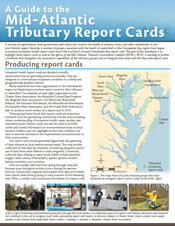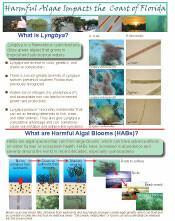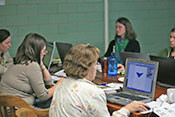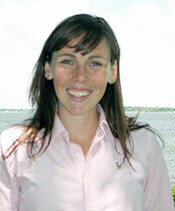A Guide to the Mid-Atlantic Tributary Report Cards
 Recently, a number of groups concerned with the health of watersheds in the Chesapeake Bay region have begun to produce ecosystem health report cards much like EcoCheck's annual Chesapeake Bay report card. This newsletter highlights those local report cards as well as the efforts of the Mid-Atlantic Tributary Assessment Coalition (MTAC). MTAC emerged from the effort initiated by EcoCheck to bring members from watershed organizations and tidal monitoring networks together in order to identify core indicators that should be monitored by all groups and to develop standards for data collection, analysis, and reporting. Currently, MTAC participants are working to produce written protocols that will help ensure uniformity of monitoring, sample analysis, and data management that will in turn allow direct comparison of data and report card scores from each region.
Recently, a number of groups concerned with the health of watersheds in the Chesapeake Bay region have begun to produce ecosystem health report cards much like EcoCheck's annual Chesapeake Bay report card. This newsletter highlights those local report cards as well as the efforts of the Mid-Atlantic Tributary Assessment Coalition (MTAC). MTAC emerged from the effort initiated by EcoCheck to bring members from watershed organizations and tidal monitoring networks together in order to identify core indicators that should be monitored by all groups and to develop standards for data collection, analysis, and reporting. Currently, MTAC participants are working to produce written protocols that will help ensure uniformity of monitoring, sample analysis, and data management that will in turn allow direct comparison of data and report card scores from each region.
Harmful Algae Impacts the Coast of Florida
 Harmful algal blooms (HABs) have increased in abundance and severity around the world in recent decades. Among coastal HABs, benthic cyanobacteria blooms, particularly Lyngbya spp., are becoming more numerous and persistent in tropical and subtropical environments. These species have become increasingly problematic in the near-shore waters of Florida and it has been suggested that this may be in part caused by nutrient enrichment resulting from highly developed coastal habitats. Both climate change and anthropogenically derived nutrients provide the potential for increases in these nuisance blooms. This fact sheet targets the general public, summarizing the findings of a National Oceanic and Atmospheric Administration's Ecology of Harmful Algae Bloom Program (NOAA-ECOHAB)-funded study.
Harmful algal blooms (HABs) have increased in abundance and severity around the world in recent decades. Among coastal HABs, benthic cyanobacteria blooms, particularly Lyngbya spp., are becoming more numerous and persistent in tropical and subtropical environments. These species have become increasingly problematic in the near-shore waters of Florida and it has been suggested that this may be in part caused by nutrient enrichment resulting from highly developed coastal habitats. Both climate change and anthropogenically derived nutrients provide the potential for increases in these nuisance blooms. This fact sheet targets the general public, summarizing the findings of a National Oceanic and Atmospheric Administration's Ecology of Harmful Algae Bloom Program (NOAA-ECOHAB)-funded study.
Annual Science Communication Course held at Oxford Lab, Maryland
 The Integration & Application Network's annual Science Communication Course was held at the Oxford Cooperative Laboratory in Oxford, Maryland this year. The course was hosted by EcoCheck, a partnership between IAN and NOAA Chesapeake Bay Office. This year's course was an intensive, one-day version that included the principles of science communication, hands-on activities and software instruction. The course was attended by NOAA, DNR, and UMCES employees and students as well as volunteer monitoring organizations working in collaboration with EcoCheck.
The Integration & Application Network's annual Science Communication Course was held at the Oxford Cooperative Laboratory in Oxford, Maryland this year. The course was hosted by EcoCheck, a partnership between IAN and NOAA Chesapeake Bay Office. This year's course was an intensive, one-day version that included the principles of science communication, hands-on activities and software instruction. The course was attended by NOAA, DNR, and UMCES employees and students as well as volunteer monitoring organizations working in collaboration with EcoCheck.
IAN welcomes back Allison Dungan
 Please welcome new Science Communicator, Allison Dungan, who has rejoined the IAN staff this spring. During the summer of 2006 Allison was an intern with IAN, focusing primarily on field work in the Coastal Bays with graduate student, Ben Fertig. After completing the internship with IAN, Allison went on to complete her degree in Environmental Studies and Political Science at Randolph-Macon College. Since then, she has worked as a biology teacher at Easton High School and an Environmental Planner for Caroline County, MD. Allison is actively involved in Talbot County soccer and the Choptank River Tributary Team.
Please welcome new Science Communicator, Allison Dungan, who has rejoined the IAN staff this spring. During the summer of 2006 Allison was an intern with IAN, focusing primarily on field work in the Coastal Bays with graduate student, Ben Fertig. After completing the internship with IAN, Allison went on to complete her degree in Environmental Studies and Political Science at Randolph-Macon College. Since then, she has worked as a biology teacher at Easton High School and an Environmental Planner for Caroline County, MD. Allison is actively involved in Talbot County soccer and the Choptank River Tributary Team.

